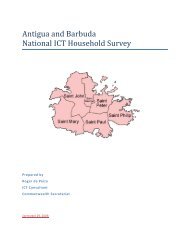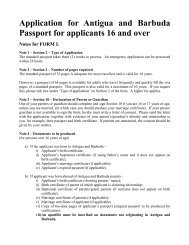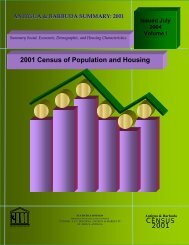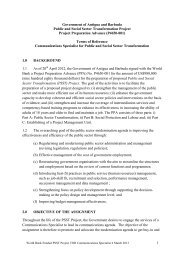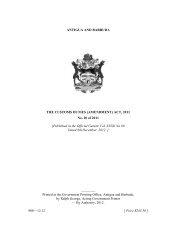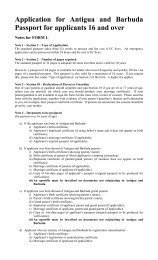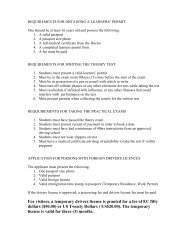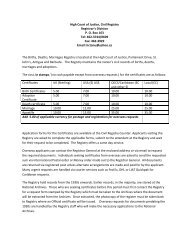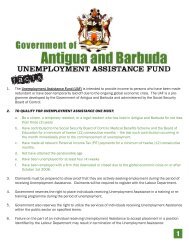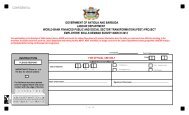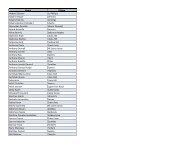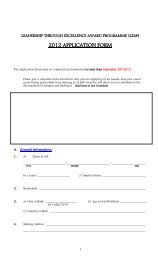Internet/Intranet - Acceptable Use Policy - Antigua & Barbuda
Internet/Intranet - Acceptable Use Policy - Antigua & Barbuda
Internet/Intranet - Acceptable Use Policy - Antigua & Barbuda
- No tags were found...
Create successful ePaper yourself
Turn your PDF publications into a flip-book with our unique Google optimized e-Paper software.
5.6 Modem connections from networked workstations (including dual bootconnections) to any other networks are specifically prohibited.6 Personal <strong>Use</strong> of <strong>Internet</strong>6.1 The Government’s <strong>Internet</strong> facility is intended to support the organization’slegitimate business requirements.6.2 Occasional and reasonable use of the <strong>Internet</strong> for personal purposes is regardedas acceptable provided that:6.2.1 Systems are not used for personal use during normal working hours.6.2.2 Systems are not used for private business or other commercial purposesincluding the sale or purchase of goods and services.6.2.3 <strong>Use</strong> of the system does not interfere with the normal performance of the user’sduties.6.2.4 There is no additional cost to the Government in using the system for personaluse.6.2.5 There is no breach of the prohibitions identified in this policy.6.3 For the purposes of clarity, the Government connects to the <strong>Internet</strong> through adedicated leased line at fixed costs. The costs to the Government, therefore,remain the same irrespective of the amount of use although performance levelswill decline as the line reaches capacity.6.4 The sites within the Government complex connect to the leased line directlyand, therefore, no additional costs are incurred for personal use for personsworking within the Government complex.7 Prohibited <strong>Use</strong>s7.1 The Government’s <strong>Internet</strong> services may not be used for the transmitting,retrieving or storing of any communications or images, which are:7.1.1 harassing - harassment is unwanted conduct (including insults and “jokes”),which relates to gender, race, sexual orientation, religion, disability or othersimilar issues.7.1.2 defamatory - defamation is the publication of material, which adversely affectsthe reputation of a person, department or company.7.1.3 copyright - copyright means that the owner of such material has the exclusive5
ight to determine how that material might be copied and used. Copyrightmaterial may not be transmitted if the owner’s permission has not beenobtained.7.1.4 pornographic - pornographic means any material of a sexual nature. As therecan be no possible legitimate business use for accessing or transmitting sexuallyexplicit materials at work, the question of whether or not such materialconstitutes pornography is not relevant to the use of the Government’s <strong>Internet</strong>services and all such material is prohibited.7.2 <strong>Use</strong> of the Government’s <strong>Internet</strong> facilities to deliberately propagate computerviruses, worms, Trojan horses or trap door programs is prohibited.7.3 <strong>Use</strong> of the Government’s <strong>Internet</strong> facilities to disable or overload any computersystem or network, or to attempt to disable, defeat or circumvent any systemintended to protect the privacy or security of another user is prohibited.7.4 <strong>Use</strong>rs must not install additional <strong>Internet</strong> or email related software, or changethe configuration of existing software without the written authorization of theGovernment’s Director of the Information Technology Center.7.5 <strong>Use</strong> of the Government’s <strong>Internet</strong> facilities to download or distribute piratedsoftware or data is prohibited.7.6 <strong>Use</strong> of the Government’s <strong>Internet</strong> facilities to upload software licensed to theGovernment, or to upload data owned by the Government without valid, writtenauthorization, is prohibited.7.7 <strong>Use</strong> of the Government’s <strong>Internet</strong> facilities to download entertainment softwareof games or to play games over the <strong>Internet</strong> is prohibited.8 Exceptions to Prohibited <strong>Use</strong>8.1 Employees who have to monitor offensive materials as part of their jobs, (e.g.Child Protection, Trading Standards, etc) may access relevant material withtheir Head of Department’s written permission.8.2 Permission will only be given to named individuals and a record of suchpermissions must be placed on official file and copied to the Director of theInformation Technology Center.8.3 Each site visit made for such purposes must be recorded in a log, whichidentifies the site, the date and time of the visit and the purpose. The log mustbe retained for a minimum of two years from the date of the visit.6
9 Monitoring9.1 The Government uses special hardware and software to monitor and control theuse of the <strong>Internet</strong>, which enables it to record (and if necessary view) all usageof the <strong>Internet</strong>. This includes, but is not limited to, user details, pages attempted,pages accessed, files downloaded, graphic images viewed and all emailcorrespondence.9.2 <strong>Use</strong>rs should not expect the use of the <strong>Internet</strong> or the contents of files to beprivate. All usage will be monitored, logged and retained as required to ensurethat users are complying with the requirements of this policy and that no misuseis taking place.10 Unintentional Incidents10.1 The nature of the <strong>Internet</strong> is such that it may not always be possible to avoidaccessing material, which is prohibited by the terms of this <strong>Acceptable</strong> <strong>Use</strong><strong>Policy</strong>.10.2 <strong>Use</strong>rs who are placed in this position should contact their Departmental ITsupport staff immediately so that their systems can be cleaned. If thedepartmental IT staff cannot clean the system, contact should be made with theIT Center’s Help Desk at 481-5300. Accidental access will not result indisciplinary action but failure to report it may result in appropriate disciplinaryaction.10.3 <strong>Use</strong>rs who believe that the <strong>Internet</strong> systems are being used in a way which theyregard as being offensive, potentially illegal or which otherwise appears tocontravene acceptable Government policy or statutory requirement shouldcontact the Information Technology Center at 481-5300 or via e-mailsupport@antigua.gov.ag11 Uploading and Downloading of Files11.1 A significant benefit of the <strong>Internet</strong> is the ability to access and distribute filesquickly and easily, and the Government is keen to ensure that this facility isavailable to users.11.2 The <strong>Internet</strong> security systems implemented by the Government includes virusscanning software which is designed to intercept any viruses in files (includingemail attachments) and all files sent and received will be scanned.11.3 Any incidents regarding the detection of viruses in files uploaded anddownloaded using the <strong>Internet</strong> services will be logged and appropriate actiontaken by the Government’s Director of the Information Technology Center.7
12 Newsgroups12.1 Newsgroups offer a wealth of potentially valuable information and advice butcan also consume inappropriately large amounts of time and energy. In addition,newsgroup messages often provide links to inappropriate web pages and usersshould be aware of the risk of inadvertently accessing unacceptable sites by thismeans.12.2 <strong>Use</strong>rs may only access newsgroups if so doing represents a reasonable return interms of effort involved for the value received.12.3 <strong>Use</strong>rs must not access newsgroups, which are not work related.12.4 <strong>Use</strong>rs must not participate in discussions, which are politically sensitive orcontroversial, whether nationally or locally, and users must not give advice orinformation, which they know to be contrary to the Government’s policies orinterests.12.5 Newsgroups are by definition public forums. <strong>Use</strong>rs must therefore not revealany information, which might reasonably be deemed to be sensitive orconfidential.13 Email and Newsgroups Usage <strong>Policy</strong>13.1 The use of office email address (your.name@antigua.gov.ag) is limited togovernment business only. Do not give out your office email address to anyperson or organization for personal contact. For personal contact, you may usehotmail or something else, but not your office email address.13.2 Do not post your office email address anywhere on any website. You run therisk of getting more junk email that way. Also be careful about placing youroffice email in online directories if, for example, you are subscribing tonewsgroups (or publications) for office purposes.13.3 Before subscribing to a newsgroup for office purposes you are required toconsult with your department’s technology personnel or the GovernmentInformation Technology Center.13.4 Do not use your office email to register for prizes or sweepstakes and NEVERend unsolicited email (“spam”) for advertising or promotion of any sort.13.5 Do not send attachments externally to anyone unless you have their permissionto do so and do not send attachments that are larger than the recipients’ mailboxcan accept.8
13.6 Do not allow others to send you attachments totaling more than six megabytes(6 MB) in size at any one time. Also, make sure that you clean out and archiveyour mailbox contents on a regular basis to ensure that your mailbox does notget filled up, and that there is a backup record of ALL official governmentemails.13.7 Save all of your email attachments and do not practice the storage of theattachment within your email. If you have large files to transfer to anyoneconsult your Ministry’s technology department or the Government InformationTechnology Center.13.8 Never open suspicious or unexpected email attachments. They may contain ascript or program that can delete your computer files, or create other severedamage within the network.13.9 Please remember that email must follow the code of conduct as expected in anyother form of written or face-to-face communication:• DON'T configure personal web-based email (e.g. hotmail, yahoo mail) toautomatically forward to work e-mail accounts (or vice versa).• DON'T forward restricted or confidential work email to your personal webbasede-mail account.• Almost no personal web-based email system provides encryption, securityor privacy. Therefore, business information, information of a confidential orsensitive nature, such as credit card numbers, passwords and other personalinformation, should not be sent using ANY web-based email system.• NEVER open suspicious or unexpected email attachments. They maycontain a script or executable program that can delete local files, sendfiles/documents or passwords to another host and severely damage thenetwork.• Passwords MUST not be words found in the dictionary.• Passwords MUST contain alpha and numeric characters and be at least 8characters long.• Personal web-based email account passwords MUST not be the same asofficial department email account passwords.• Employees must not attempt to read another person's email unless otherwiseauthorized. Employees should have no reasonable expectation of privacy inemail transmitted, received and stored on and/or through the government'ssystem. Any email sent or received through the government’s system is theproperty of the Government of <strong>Antigua</strong> and <strong>Barbuda</strong> and is not a privateemployee communication (whether created or received).• It is unacceptable to send large files such as singing Christmas cards oranimated Valentine's greetings as attachments to email - such attachmentscan seriously affect the performance of a department's network. Rememberthat email is the leading source of computer viruses; be especially suspiciousof attachments. Unencrypted email is not secure or private. Employees have9
a responsibility to put only non-sensitive information in an email. Therecipient is responsible for handling the message with respect and securingthe sender's permission before forwarding it.• Employees must have their head of department’s permission before usingthe Government's Information Technology resources for large-scaledistribution of e-mail.13.10 Email that is of a personal or transitory nature need not be archived. However,email that is an official record of government is to be retained. Email is anofficial record if:• It was created or received as part of the normal business practices of thedepartment and it relates to the department's mandate,• It documents, interprets or otherwise supports departmental policies,decisions, transactions and events or it contains informational value ofsignificance to the department.13.11 Many employees access personal or (other) work email through personal webbasedaccounts hosted on sites such as Hotmail or Yahoo. Currently, thisincidental use of the Government's Information Technology infrastructure ispermitted. However, such web-based email systems must be used cautiously. Ifirresponsible use of web-based email damages departmental computers andnetworks, permission to access personal web-based email from work may haveto be rescinded.14 Publication of Material14.1 The Government has a corporate web site providing information about all of itsservices.14.2 Because of the risks associated with the <strong>Internet</strong> and the need for theGovernment to maintain the clarity, consistency and integrity of its image, nouser, section or directorate of the Government may establish or maintain aseparate <strong>Internet</strong> or FTP site except where this is specifically authorized inwriting.14.3 Authorization for separate websites will only be given in exceptionalcircumstances and must be renewed annually. Authorization can ONLY beobtained through the Minister of Information Technology or the Director of theGovernment Information Technology Center and the user is responsible forobtaining and keeping this permission up-to-date.15 Breach of <strong>Policy</strong>15.1 This <strong>Acceptable</strong> <strong>Use</strong> <strong>Policy</strong> has been drafted in such a way as to protect both theGovernment and users and any breach of policy will be dealt with in accordancewith the Government’s general disciplinary procedures.10
15.2 Failure to adhere to this policy will be considered to be a potentially seriousdisciplinary offence, which could lead to dismissal.15.3 In addition, users are advised that the following actions may also be taken bythird parties:15.3.1 Harassment is a criminal offence for which the harasser can be imprisoned.Victims of harassment may also be able to claim damages from the harasser aswell as the Government.15.3.2 A person or company may sue individuals as well as the Government fordamages if defamation of reputation can be demonstrated.15.3.3 A copyright owner may sue individuals for damages as well as the Governmentin the event of breach of copyright.15.3.4 Accessing and transmitting sexual material may be a criminal offence. Thecourts may take action against individuals where appropriate.15.4 The Government will not hesitate to bring to the attention of the appropriateauthorities any use of its systems by users, which it believes might be illegal.16 Further Information16.1 If you would like further information on the contents of this <strong>Acceptable</strong> <strong>Use</strong><strong>Policy</strong>, or on any matters relating to it, please contact the IT Center’s Director at481-5300.17 History17.1 This <strong>Policy</strong> was first drafted on the November 7, 2005 and circulated to thePersonnel and Legal Departments for comment. The current draft incorporatestheir comments.17.2 The <strong>Policy</strong> was first approved by the Government on February 23 rd 2006.17.3 There have been no amendments to date.11
ENFORCING THEACCEPTABLE USEPOLICY12
Enforcing the <strong>Acceptable</strong> <strong>Use</strong> <strong>Policy</strong>byMoving to a Domain Network Environment18 INTRODUCTION18.1 To enforce the <strong>Acceptable</strong> <strong>Use</strong> <strong>Policy</strong>, and due to significantly increased securityrisks, and significant ongoing loss of Government data due to lack of appropriatebacking up, the Government IT Center has decided to upgrade the GovernmentWide Area Network (WAN) to a domain or client-server environment to strictlyenforce security to protect the network, and to provide limited automated backupof important Government data.This is urgently needed and will result in greater security, better management andcontrol of Government's scarce resources, and lower maintenance costs.19 BACKGROUND19.1 The government computer network has become a critical tool in helping inmeeting data processing and data communication needs. For this reason, it isimportant that processes to protect the data, processing and communicationfacilities be installed and must be distributed throughout the network. Forexample, sending sensitive files that are protected with stringent access controlson one system, over the network to another system that has no access controlprotection, defeats the efforts made on the first system. Simply put, the network isonly as strong as its weakest link.19.2 <strong>Use</strong>rs must ensure that their data and the Local Area Network (LAN) itself areadequately protected. LAN security should be an integral part of the whole LAN,and should be important to all users.19.3 Electronic mail (email), a major application provided by most networks isreplacing much of the interoffice, inter-organizational and even international mailthat is written on paper and placed in an envelope. This envelope provides someconfidentiality between the sender and receiver, and it can even be argued that theintegrity of the paper envelope provides the receiver with some degree ofassurance that the message was not altered.19.3.1 Using electronic mail does not provide these assurances. Simple transfers onunprotected networks of inadequately protected electronic mail messages can becaptured and read or perhaps even altered. For some networks, there can be noassurance that the message actually was sent from the named sender.13
19.4 Fortunately tools such as encryption, digital signatures, and messageauthentication codes help solve these problems and can help provide someassurance.20 PROPOSED SOLUTION20.1 In an effort to secure the government network, the decision has been taken toimplement the following Network Security policies. These policies will secure allphysical and logical access to government property, including hardware, software,and data.20.1.1 These policies will be strictly enforced by upgrading the current peer-to-peernetworks on the WAN to full domain network environment, using domaincontrollers. These domain controllers will be operating Microsoft Windows 2003server or similar Network Operating Systems (NOS).21 Hardware21.1 The responsibility of the physical security of all systems will be given to the Headof each Department. This means access to and movement of computers and anypart thereof must be authorized by such person.21.2 Any missing computers and parts must be reported to the Head ofDepartment who will contact the IT Center and also initiate the procedures forinvestigation and any other procedures used for the theft of government property.21.3 Access will be given to the IT Center, which will take full responsibility for allrooms containing servers and any IT equipment not directly used by users. Anyaccess required by any department will be given on an approved discretionarybasis.21.4 Any system not solely serviced and maintained by the IT Center will not be puton the government’s network.22 Software and <strong>Use</strong>r Access22.1 All software that do not pertain to the functioning of the Government’s operationswill be removed from all computers.22.2 All access to removable media will be terminated, except such access is requiredand authorized by the head of department and the user signs a Non DisclosureAgreement (NDA) (e.g. CDs, DVDs and USB external devices).14
22.2.1 All access to web based email systems except government’s email systems willbe terminated e.g. Hotmail.com yahoo mail in a phased manner.22.3 All instant messenger services that do not meet the IT Center security policy willnot be installed on the systems.22.4 All users will be furnished with network usernames and passwords, which will beused to secure access to all government data to which they are authorized to haveaccess.22.5 All users will be denied access to the local machine, thereby enforcing automateddata backup procedures.23 BENEFITSWe envision that the following benefits will be derived from this policy;23.1 Centralized management of all computer and network resources23.2 Full data security and integrity23.3 Centralized management of all users23.4 Virus and spyware control23.5 Secure centralized backup of all important government data23.6 Software application protection from conflicting drivers or other software23.7 Operating system protection from conflicting drivers or other software.15



